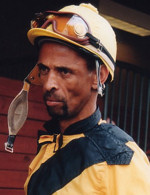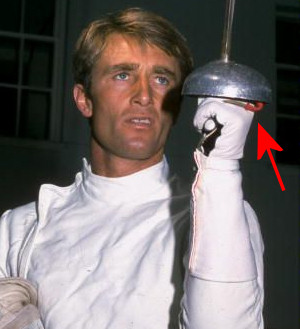The 7 Ballsiest Sports Cheats Ever

You might think that sportsmanship is dead, what with the steroids and signal-stealing cameras in the headlines. And you'd be right.
But what you may not realize is that sportsmanship died long, long ago. In fact, these modern performance enhancers can't hold a candle to some of the ballsiest and outright insane cheats throughout sporting history.
The Spanish Rig the Paralympics
 One thing people would never sully with deception is the Paralympics (which is like the Special Olympics, where people with disabilities compete). Right? Who would stoop as low as that?
One thing people would never sully with deception is the Paralympics (which is like the Special Olympics, where people with disabilities compete). Right? Who would stoop as low as that?
The short answer: the Spanish. In an act of desperation so pathetic it inspires pity, some of the players on the Spaniards' gold medal-winning Paralympic basketball team turned out not be disabled at all. Yes, that South Park episode and that Johnny Knoxville movie both turned out to be based on a true story.
Undercover journalist, Carlos Ribagorda, blew the lid off the scandal. You may assume that only one or two of the overall squad was ineligible, but that would be underestimating the desperation of the Spanish. A whopping 10 of the 12 members of the basketball squad had no mental difficulty. They were just athletes that sucked enough to not make it into the Olympic team.

Based on actual events
Did it work?
The Spaniards were disqualified from the basketball competition and stripped of their title. There was no evidence of any wrongdoing in other Paralympic events, and we're going to accept that the rest of them were disabled. The alternative, which is that most of their athletes were normal and yet only finished third overall, is too sad to contemplate.
Liston Burns the Gloves

According to Sun Tzu, war is not won by superior might, but by subversion, deceit and trickery. In 1964, when heavyweight champ Sonny Liston went to war with Muhammad Ali (then Cassius Clay) so many of those tactics were used that somewhere in the afterlife, Sun Tzu must be sporting a raging erection.
Sonny Liston was the Tyson of his day (In that he spent most of his time in prison or punching peoples faces off) and the experienced fighter was the massive favorite ahead of the 22-year-old Ali, who was coming off a pair of bad fights against mediocre fighters.
 However, after three rounds, Ali wasn't just winning, he was dancing around and making the champ look like a drunk playing Whack-A-Mole. At the end of the third round, Liston allegedly told his corner to "burn the gloves", which meant smear them with the ointment they use to close cuts (you don't want to get that goop in your eyes).
However, after three rounds, Ali wasn't just winning, he was dancing around and making the champ look like a drunk playing Whack-A-Mole. At the end of the third round, Liston allegedly told his corner to "burn the gloves", which meant smear them with the ointment they use to close cuts (you don't want to get that goop in your eyes).
The next round comes and, after a few blows to the face, Ali goes back to the corner and tells them he's been blinded.
Did it work?
Ali supposedly told his corner he didn't want to continue, but they shoved him out and he stumbled around, blind, while Liston hammered him. Ali survived the round and won the fight in the seventh, partly because he had engaged in some shenanigans of his own.
From the moment the contract was signed several months before the bout, Ali began his campaign to destroy Liston's sanity. Ali started showing up to sparring sessions to taunt Liston. He followed Liston to a casino and mocked him for losing, an act that nearly resulted in a fight on the casino floor. He was waiting at a Miami airport, to ambush Liston with rhyming annoyance.
Ali showed up at Liston's training headquarters with a bus full of girls. He even turned up at Liston's house in the middle of the night, taking the harassment into stalker territory. When it came time for the actual fight, an unbalanced Liston fell behind early and, despite the poison glove trick, never recovered.

Sun Tzu would have been proud.
Jockey Turns On the Fog Cheat Code

In 1990, jockey Sylvester 'Sly' Carmouche lived up to his name and showed how a gentleman woos mother nature. On a bitterly cold day in December, Sly was the shock winner at Delta Downs in Louisiana (the odds against him were 23-1). How'd he pull it off?
Taking advantage of the fog, Sly waited for the race to begin, then let the rest of the pack to run off into the fog. He stopped, then just waited for the other racers to come around the track behind him. At that point he sped up and and left the other racers in his dust.
Did it work? As with most cheats, it was Sly's greed that brought him down. People were willing to accept this outside bet winning--anything can happen. However the margin of his victory began to raise a few eyebrows. Even in the tricky conditions, Sly managed to win by an immense 24 lengths (about 200 feet) and only missed the record set on that course by 1.2 seconds.
As with most cheats, it was Sly's greed that brought him down. People were willing to accept this outside bet winning--anything can happen. However the margin of his victory began to raise a few eyebrows. Even in the tricky conditions, Sly managed to win by an immense 24 lengths (about 200 feet) and only missed the record set on that course by 1.2 seconds.
Soon Jockeys began coming forward saying that they'd never actually seen Sly go past them, something that most people would probably have been slightly suspicious of much earlier, since that pretty much narrows the possibilities to a flying horse or teleportation.
Eventually Sly got a 10-year ban but was reinstated after 8, probably because he found a way to cheat time somehow.
Boris and His Magical Blade
 In 1976, the Soviets and the west were in a race to see who could perfect cheating technology first. During the 1976 Olympic games pentathlon, it became clear who had the edge.
In 1976, the Soviets and the west were in a race to see who could perfect cheating technology first. During the 1976 Olympic games pentathlon, it became clear who had the edge.
What did raise suspicions was when, during his match, the British captain Jim Fox leaned all the way back and saw Boris' sword come up a foot short, and yet the buzzer still sounded and the point was awarded. This is basically the equivalent of Shaq stepping up for a free throw, tossing up an air ball and still getting the point.
At this point the British squad called shenanigans and the sword was confiscated. In those events, there is an electronic sensor in the sword that determines when a point had been struck.

It turned out Boris had tampered with the circuit system, allowing him to award himself points at will.
Did it work?
After he was caught, the entire pentathlon team was disqualified and the British won the gold.

As if being caught performing a fairly obvious attempt at cheating, the story still manages to get more embarrassing as, after the confiscation of the sword, the bout continued and Boris ran away as a convincing winner. So the Soviets were from the New England Patriots school of cheating, which says that even if you're vastly superior to your opponent, you cheat anyway. Just for the pure hell of it.
Dude(?) Looks Like a Lady

Here at Cracked, we're are all about equality and accurate representation of the facts, so far be it from us to make any unverified accusations. However, if the Press "sisters" weren't men, then they did a damn good job of acting like they had penises. Are we saying that there are some things that men are just naturally better at? The answer is yes, if we're talking about having to throw a heavy metal ball really far.
Tamara Press, the eldest of the two sisters, was a leading figure in the shot put and discus from 1958 until she left the sport. Irina Press was a track and field expert. During their reign of dominance, the Press sisters won five Olympic gold medals, a single silver and several more medals in other competitions. They also set 26 world records.
Sure, that kind of record from just two appearances in Olympic games could raise eyebrows, but hey, would you say Ben Johnson was a cheat based solely on his setting an unthinkable world record? Well, maybe that's not the best example.
People were already questioning the Press sisters, specifically whether or not they were really the Press brothers (yes, people actually started derisively calling them that). Theories ranged from the pair being hermaphrodites (though the rarity of that condition means the odds against both sisters having it are astronomical) to accusations they were injecting male hormones.

This suspicion escalated further when it was announced that gender testing would be implemented for the games ... at which point both Press sisters abruptly retired.
Did it work?
The sisters were never formally accused and lived the rest of their lives as heroes in Russia. Many people who support the Press sisters insist that their leaving the sport right when proof was demanded was just unfortunate timing. We'll let you be the judge.

Hitching a Ride at the Tour de France

While simply catching a ride from a car is an undeniably effective way to win a bicycle race, its lack of deniability and general dumb shit blatancy severely detract from this being a usable method of cheating. Or so you'd think.
In 1904, during only the second ever Tour de France, Hippolyte Acouturier thought he had found a foolproof way to sidestep those meddlesome rules that were impeding his chances of winning with little or no effort.

This is Hippolyte. Seriously.
You can't blame him, back then the Tour de France was mostly shenanigans, with some bike racing in between (for instance, Acouturier had lost the first Tour de France when someone spiked his water bottle).
In fact, accounts of the first races say competitors used everything from nails and broken glass on the road, to itching powder in the opposing riders' shorts to get an edge. At one point an angry mob randomly attacked some riders and had to be driven away with gunfire. Yes, bicycle racing was about a thousand times more awesome back then.

Being a man of at least some moral fiber, Hippo decided against crippling the performance of his opponents and instead came up with an awe-inspiring method of cheating that would leave other, lesser geniuses, scratching their head in wonder.
He didn't simply grab hold of the bumper of some car and hold on for dear life, as a lesser man would have. No, he attached a wire to the bumper of the car, and on the other end of the wire was a hunk of cork that he would hold onto.
With his teeth.
While this plan has its merits, we can't help but think that a slip knot tied to his handlebars would have worked just as well. Only, you know, without the probable need for radical reconstructive dental surgery.
Did it work?
Hippolyte won four of the six stages, but lost the race to another guy who, as it turns out, was also cheating using some other method out of the Wile E. Coyote playbook. Organizers actually wound up disqualifying the top four finishers and awarded the race to fifth-place finisher Henri Cornet, who apparently was the only one who found a way to cheat that wasn't obvious from a half-mile away.
Harding Goes For the Knees

We couldn't leave this one off the list, being the most famous, and least subtle, example of cheating in sports history.
What gets forgotten in the story that dominated headlines in the mid-'90s, is that Tonya Harding was, at one time, really freaking good. She was the first American woman to complete a triple-axel jump, or at least the first to do it while somebody was watching. In 1991 she placed second in the World Figure Skating Championships.
But then, around 1993, things started to get weird. She sat out a competition after somebody called in a bomb threat against her ... and some claim that Harding called it in herself. She had wandered off from the medal ceremony at a US Championship, which was a problem because she was one of the people getting a medal.
Then, at the 1994 US Figure Skating Championships, Harding took drastic action (and by drastic we mean "OH MY GOD SOMEBODY CALL AN AMBULANCE").
After a practice session Shane Stant, hired in part by Hardings ex-husband, decided to show mobsters everywhere how it's done by kneecapping favorite Nancy Kerrigan using a metal baton.
 Did it work?
Did it work?
Harding did go on to win the event after Kerrigan was forced to pull out. But after the inevitable arrest of Stant (kind of hard to get away with assaulting someone in front of reporters) the other conspirators were also arrested and Harding was prosecuted. Harding only avoided jail time after pleading guilty, and was sentenced to 500 hours of community service and a $160,000 fine.
This was also backed up by stripping Harding of her title and banning her from all future sanctioned events. In probably the biggest understatement in recorded history, attempting to cripple an opponent was referred to as showing "a clear disregard for fairness, good sportsmanship and ethical behavior."
Things managed to get more embarrassing for Harding as during the winter Olympics just a month after the attack (several months before Harding's ban started) Kerrigan went on to finish an impressive second. Six places ahead of Harding.
Though perhaps Harding got the last laugh, as she went on to have a successful career in amateur porn and female boxing.

OK, maybe not.
If you liked that, you'll probably enjoy our look at The 10 Most Insane "Sports" in the World . Or, watch this video to find out The Terrible Secret Behind the World's Greatest Card Trick!